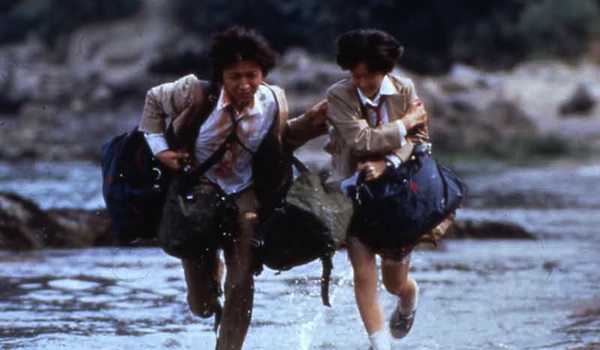Battle Royale Review
When Quentin Tarantino named Battle Royale as his favorite movie of the past 20 years, my interest was immediately piqued. After researching the film, however, I had little desire to watch it. Who’d want to spend two hours watching children kill one another? It sounds despicable and horrifying. Well, something called The Hunger Games brought Battle Royale back into my consciousness, and I thought it was time to give this bloody film a try.
Damn glad I did, folks. Battle Royale is brilliant. It tackles its subject matter with precisely the right attitude—a strange mix of satire and emotional earnestness—to make you forgive yourself for being entertained by such horrifying subject matter. And if the film doesn’t earn its four stars for that alone, there’s also the gorgeous camerawork, solid performances, and smart editing.
The film has been so frequently compared to The Hunger Games because the centerpieces of both films are bloody arena battles with minors, but the two films take very different routes to get there. While The Hunger Games features a laborious set-up and the introduction of what’s essentially a whole new world, Battle Royale takes place in what’s still called Japan in the very near future. Due to rising unemployment, the crime rate among Japanese youth has skyrocketed. Parents and teachers have lost any semblance of control over their children, which led to a monstrous act by the government. The Battle Royale Act decrees that every year, one class of ninth-graders will be selected at random to fight to the death on a deserted island. There are few rules, but they only have three days. At the end of that time, if no single boy or girl has won, they’ll all be executed when a collar keeping them under control explodes around their necks. Each child is given a pack with rations and a randomly assigned weapon inside it. Some are lucky and draw guns or knives. Others start the Battle Royale off on the wrong foot with binoculars or a lid to a cooking pot.
What’s most interesting about Battle Royale is the different approaches the students take to their predicament. Some, like Shuya (Tatsuya Fujiwara) and Noriko (Aki Maeda), team up right away. They’re eventually joined by Kawada (Taro Yamamoto), a former Battle Royale winner mysteriously back for another go-around, as they try to avoid killing and simply find a way to disable their collars and escape. Others go about things much differently. Some simply kill themselves, unable to face the horrors associated with killing a friend. Then, there are the few who relish this opportunity. Mitsuko (Ko Shibasaki) uses her sexuality to trick and kill the young men and women who made her an outcast over the years, while Kiriyama (Masanobu Ando), another former competitor who survived, is nothing more than a killing machine, thrilled at the prospect of spilling more blood.
The social dynamics in Battle Royale are all the more complicated because these individuals all know one another. Presumably, it’s one thing to be forced into killing a stranger; One assumes survival instincts will kick in. But taking the life of a friend, one can only imagine, is a different animal entirely, and Battle Royale depicts the act as morally repugnant as it really is, despite seeming necessary in this situation. At one point, Shuya, who seems almost hell-bent on not killing anyone, whatever the consequences are, is attacked and the ensuing fight results in a death. It’s unclear whether he was the cause of this, but the guilt stays with him, and a few other good ones almost revolt against him because he seemed partially culpable. Throw on top of all that the fact that the head official of the battle (Takeshi Kitano) is a former teacher of theirs, and you have a situation that’s fucked up every which way you could imagine.
Fukasaku doesn’t shy away from showing blood, and though it’s not something anyone really wants to see, it’s hard to argue against it because you won’t for a second feel anything but completely invested in what’s happening. There are some notes about young love that seem more satirical than sincere. Beyond that, however, the film is just a balls-to-the-wall brawl. It moves along at a very brisk pace, never letting you get too invested in the personalities outside our five main protagonists and antagonists. And really, there isn’t much about Shuya, Mitsuko, and company that would make you shed a tear if they lost their lives. Because Fukasaku depicts this horrific event so coldly, we never become 100% invested in its outcome. The joy, instead, comes from the wild ride we’re taken on.
It’s folly to argue for Battle Royale‘s appeal outside a very niche group of cinephiles and horror maniacs. But if you carry the membership card of either group, I can’t fathom you not appreciating what this film has to offer.















